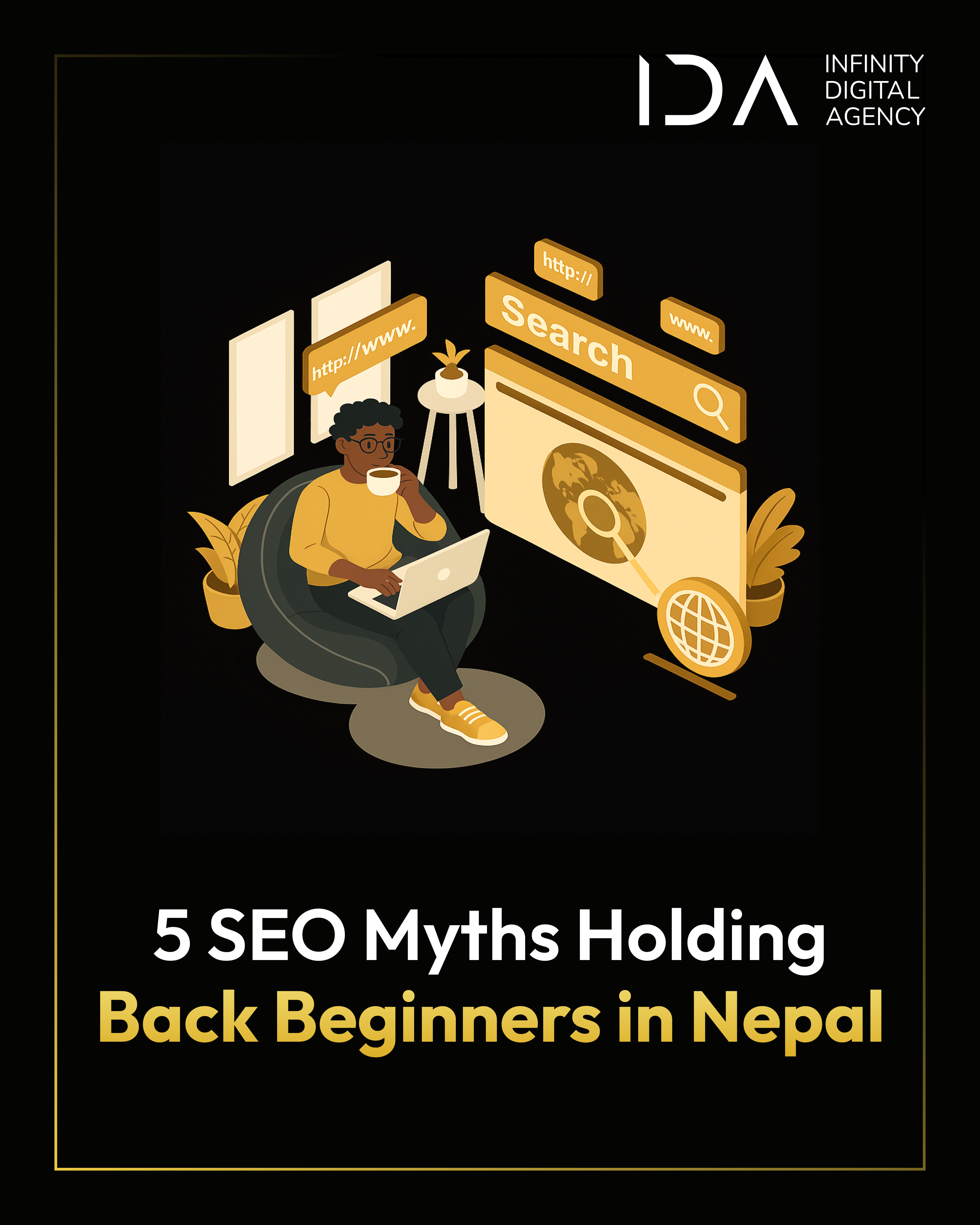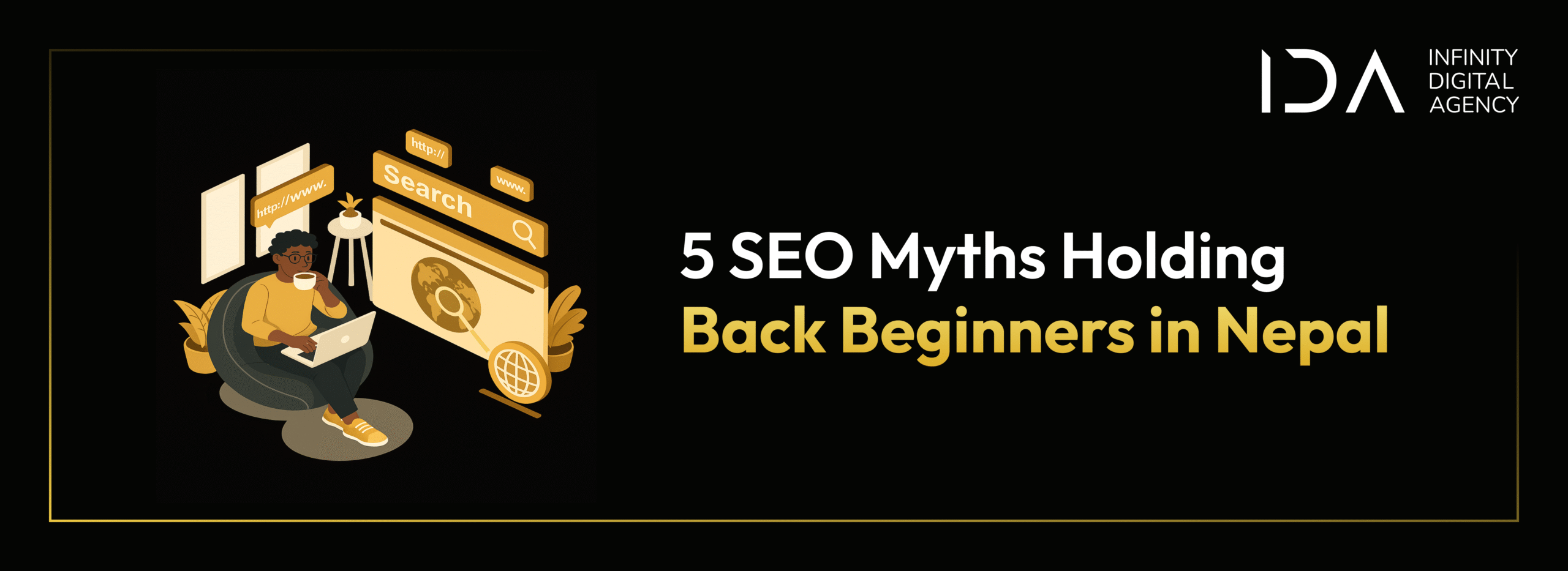Search Engine Optimization (SEO) is one of the most essential parts of building a strong online presence. But SEO myths are making businesses and new website owners in Nepal still misunderstand how it works. These actions lead to poor results, missed opportunities, and in some cases, loss of valuable traffic.
This article dispels five common SEO myths that continue to circulate in Nepal. Based on recent insights and local examples from 2025, we’ll also examine the actual facts.
Myth 1: SEO is a One-Time Task
What people think:
Many believe you do SEO only once, when launching a website or writing the first few articles.
The reality:
SEO is not a one-time setup. It is an ongoing process that needs regular updates, monitoring, and improvement. Search engines like Google frequently change how they rank websites. Your competitors are also updating their content. If you stop working on your SEO, your visibility in search results can drop significantly.
Local example:
A hotel chain in Kathmandu experienced a 37% drop in organic traffic within six months simply because they didn’t update their SEO strategies or fix outdated pages.
What you should do:
- Regularly review your website content and fix errors
- Monitor keyword performance and adjust accordingly
- Stay updated on changes in search engine algorithms
- Keep your website fast, mobile-friendly, and secure
Myth 2: Using a Lot of Keywords Improves Rankings
What people think:
The more times a keyword appears in your content, the better your chances of ranking higher on Google.
The reality:
This technique, known as “keyword stuffing,” is now outdated and harmful. Google’s algorithm in 2025 is designed to understand the meaning behind your content. It rewards clarity, usefulness, and natural writing over repeated keywords.
Pages that focus on the user’s intent—answering real questions or solving problems—perform better in search results.
What you should do:
- Use your main keyword naturally a few times
- Focus on writing content that matches what the reader is looking for
- Include related terms, synonyms, and valuable details that add value.
Myth 3: Social Media Directly Improves SEO Rankings
What people think:
Posting regularly on platforms like Facebook, Instagram, or TikTok directly boosts your website’s Google rankings.
The reality:
Search engines do not use social media likes, shares, or followers to rank pages. However, social media can still indirectly support your SEO efforts.
More people can discover your website when you share helpful content on social platforms. This can lead to higher traffic, more backlinks, and stronger brand awareness — all of which can help with SEO over time.
What you should do:
- Use social media to distribute helpful blog posts or resources from your website
- Encourage followers to visit your website for more information
- Build relationships and earn links from trusted websites in your industry
Myth 4: More Keywords Means Better SEO
What people think:
If your content includes many different keywords, it will reach more people.
The reality:
Too many keywords can make your content confusing, hard to read, and less effective. Search engines care more about quality, relevance, and how well your content answers a specific question or topic.
Targeting too many keywords at once usually results in lower rankings and a poor user experience.
What you should do:
- Focus on one main keyword or topic per page
- Use keywords that are relevant to what your audience is searching for
- Write clearly and simply, with your readers in mind
Myth 5: Local SEO Doesn’t Matter for Online-Only Businesses
What people think:
Local SEO is unnecessary if your business doesn’t have a physical store.
The reality:
Even if you work remotely or operate online, people in your local area still search for services or information about your offer. Local SEO helps your website appear in search results when someone nearby looks for a product or service like yours.
In Nepal, more users are typing location-based searches such as “freelance photographer in Bhaktapur” or “online yoga class in Kathmandu.” If your site is optimized for local search, you can show up in those results.
What you should do:
- Create and verify a Google Business Profile
- Mention your location in website content and metadata
- Get listed in local directories relevant to your field
- Use location-based keywords when appropriate
Final Thoughts
Understanding SEO is the first step toward building a strong and lasting online presence. While the digital landscape in Nepal is growing fast, many businesses are still being held back by outdated practices and common SEO myths. These misconceptions waste time and resources and can limit your website’s ability to reach the right audience.
Effective SEO is not about shortcuts or keyword tricks but strategy, relevance, and consistency. By focusing on real user needs, optimizing content regularly, and staying updated with industry changes, you’ll set yourself apart in an increasingly competitive market.
Need Help With SEO in Nepal?
If you’re looking for expert support to improve your website’s search rankings and grow your online presence, Infinity Digital Agency is here to help. Our team specializes in data-driven SEO strategies tailored to the unique needs of Nepali businesses.
Let us help you cut through the noise, debunk outdated tactics, and build a solid SEO foundation that delivers real results.
Visit Infinity Digital Agency for a free SEO audit or consultation today.

